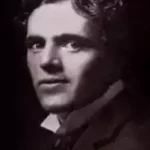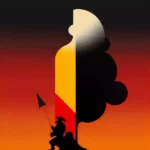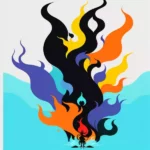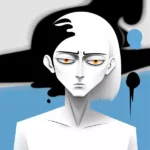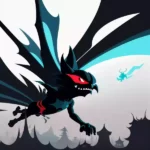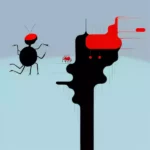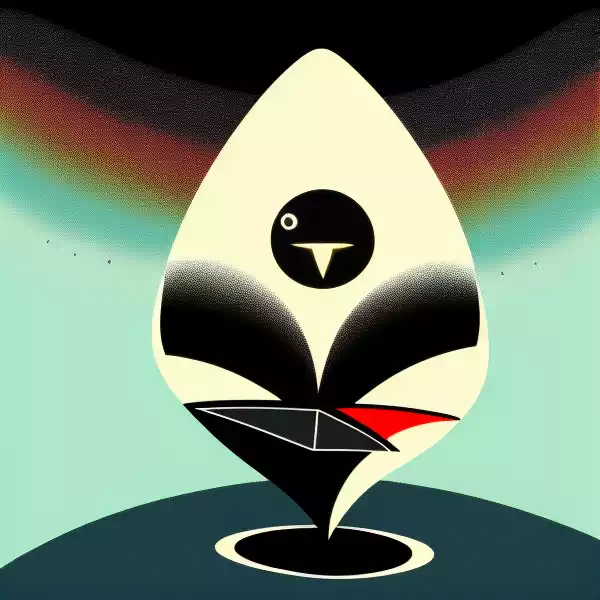 | |
Planchette | |
| Author | Jack London |
|---|---|
| Published |
1891
|
| Language | English |
| Nationality | American |
| Genre | Adventure, Naturalism |
1891 Short Story
Planchette
Planchette is an English Adventure, Naturalism short story by American writer Jack London. It was first published in 1891.
Planchette
by Jack London
“It is my right to know,” the girl said.
Her voice was firm-fibred with determination. There was no hint of pleading in it, yet it was the determination that is reached through a long period of pleading. But in her case it had been pleading, not of speech, but of personality. Her lips had been ever mute, but her face and eyes, and the very attitude of her soul, had been for a long time eloquent with questioning. This the man had known, but he had never answered; and now she was demanding by the spoken word that he answer.
“It is my right,” the girl repeated.
“I know it,” he answered, desperately and helplessly.
She waited, in the silence which followed, her eyes fixed upon the light that filtered down through the lofty boughs and bathed the great redwood trunks in mellow warmth. This light, subdued and colored, seemed almost a radiation from the trunks themselves, so strongly did they saturate it with their hue. The girl saw without seeing, as she heard, without hearing, the deep gurgling of the stream far below on the canyon bottom.
She looked down at the man. “Well?” she asked, with the firmness which feigns belief that obedience will be forthcoming.
She was sitting upright, her back against a fallen tree-trunk, while he lay near to her, on his side, an elbow on the ground and the hand supporting his head.
“Dear, dear Lute,” he murmured.
She shivered at the sound of his voice–not from repulsion, but from struggle against the fascination of its caressing gentleness. She had come to know well the lure of the man–the wealth of easement and rest that was promised by every caressing intonation of his voice, by the mere touch of hand on hand or the faint impact of his breath on neck or cheek. The man could not express himself by word nor look nor touch without weaving into the expression, subtly and occultly, the feeling as of a hand that passed and that in passing stroked softly and soothingly. Nor was this all-pervading caress a something that cloyed with too great sweetness; nor was it sickly sentimental; nor was it maudlin with love’s madness. It was vigorous, compelling, masculine. For that matter, it was largely unconscious on the man’s part. He was only dimly aware of it. It was a part of him, the breath of his soul as it were, involuntary and unpremeditated.
But now, resolved and desperate, she steeled herself against him. He tried to face her, but her gray eyes looked out to him, steadily, from under cool, level brows, and he dropped his head upon her knee. Her hand strayed into his hair softly, and her face melted into solicitude and tenderness. But when he looked up again, her gray eyes were steady, her brows cool and level.
“What more can I tell you?” the man said. He raised his head and met her gaze. “I cannot marry you. I cannot marry any woman. I love you–you know that–better than my own life. I weigh you in the scales against all the dear things of living, and you outweigh everything. I would give everything to possess you, yet I may not. I cannot marry you. I can never marry you.”
Her lips were compressed with the effort of control. His head was sinking back to her knee, when she checked him.
“You are already married, Chris?”
“No! no!” he cried vehemently. “I have never been married. I want to marry only you, and I cannot!”
“Then–”
“Don’t!” he interrupted. “Don’t ask me!”
“It is my right to know,” she repeated.
“I know it,” he again interrupted. “But I cannot tell you.”
“You have not considered me, Chris,” she went on gently.
“I know, I know,” he broke in.
“You cannot have considered me. You do not know what I have to bear from my people because of you.”
“I did not think they felt so very unkindly toward me,” he said bitterly.
“It is true. They can scarcely tolerate you. They do not show it to you, but they almost hate you. It is I who have had to bear all this. It was not always so, though. They liked you at first as . . . as I liked you. But that was four years ago. The time passed by–a year, two years; and then they began to turn against you. They are not to be blamed. You spoke no word. They felt that you were destroying my life. It is four years, now, and you have never once mentioned marriage to them. What were they to think? What they have thought, that you were destroying my life.”
As she talked, she continued to pass her fingers caressingly through his hair, sorrowful for the pain that she was inflicting.
“They did like you at first. Who can help liking you? You seem to draw affection from all living things, as the trees draw the moisture from the ground. It comes to you as it were your birthright. Aunt Mildred and Uncle Robert thought there was nobody like you. The sun rose and set in you. They thought I was the luckiest girl alive to win the love of a man like you. ‘For it looks very much like it,’ Uncle Robert used to say, wagging his head wickedly at me. Of course they liked you. Aunt Mildred used to sigh, and look across teasingly at Uncle, and say, ‘When I think of Chris, it almost makes me wish I were younger myself.’ And Uncle would answer, ‘I don’t blame you, my dear, not in the least.’ And then the pair of them would beam upon me their congratulations that I had won the love of a man like you.
“And they knew I loved you as well. How could I hide it?–this great, wonderful thing that had entered into my life and swallowed up all my days! For four years, Chris, I have lived only for you. Every moment was yours. Waking, I loved you. Sleeping, I dreamed of you. Every act I have performed was shaped by you, by the thought of you. Even my thoughts were moulded by you, by the invisible presence of you. I had no end, petty or great, that you were not there for me.”
“I had no idea of imposing such slavery,” he muttered.
“You imposed nothing. You always let me have my own way. It was you who were the obedient slave. You did for me without offending me. You forestalled my wishes without the semblance of forestalling; them, so natural and inevitable was everything you did for me. I said, without offending me. You were no dancing puppet. You made no fuss. Don’t you see? You did not seem to do things at all. Somehow they were always there, just done, as a matter of course.
“The slavery was love’s slavery. It was just my love for you that made you swallow up all my days. You did not force yourself into my thoughts. You crept in, always, and you were there always–how much, you will never know.
“But as time went by, Aunt Mildred and Uncle grew to dislike you. They grew afraid. What was to become of me? You were destroying my life. My music? You know how my dream of it has dimmed away. That spring, when I first met you–I was twenty, and I was about to start for Germany. I was going to study hard. That was four years ago, and I am still here in California.
“I had other lovers. You drove them away–No! no! I don’t mean that. It was I that drove them away. What did I care for lovers, for anything, when you were near? But as I said, Aunt Mildred and Uncle grew afraid. There has been talkfriends, busybodies, and all the rest. The time went by. You did not speak. I could only wonder, wonder. I knew you loved me. Much was said against you by Uncle at first, and then by Aunt Mildred. They were father and mother to me, you know. I could not defend you. Yet I was loyal to you. I refused to discuss you. I closed up. There was half-estrangement in my home–Uncle Robert with a face like an undertaker, and Aunt Mildred’s heart breaking. But what could I do, Chris? What could I do?”
The man, his head resting on her knee again, groaned, but made no other reply.
“Aunt Mildred was mother to me, yet I went to her no more with my confidences. My childhood’s book was closed. It was a sweet book, Chris. The tears come into my eyes sometimes when I think of it. But never mind that. Great happiness has been mine as well. I am glad I can talk frankly of my love for you. And the attaining of such frankness has been very sweet. I do love you, Chris. I love you . . . I cannot tell you how. You are everything to me, and more besides. You remember that Christmas tree of the children?–when we played blindman’s buff? and you caught me by the arm so, with such a clutching of fingers that I cried out with the hurt? I never told you, but the arm was badly bruised. And such sweet I got of it you could never guess. There, black and blue, was the imprint of your fingers–your fingers, Chris, your fingers. It was the touch of you made visible. It was there a week, and I kissed the marks–oh, so often! I hated to see them go; I wanted to rebruise the arm and make them linger. I was jealous of the returning white that drove the bruise away. Somehow,–oh! I cannot explain, but I loved you so!”
In the silence that fell, she continued her caressing of his hair, while she idly watched a great gray squirrel, boisterous and hilarious, as it scampered back and forth in a distant vista of the redwoods. A crimson-crested woodpecker, energetically drilling a fallen trunk, caught and transferred her gaze. The man did not lift his head. Rather, he crushed his face closer against her knee, while his heaving shoulders marked the hardness with which he breathed.
“You must tell me, Chris,” the girl said gently. “This mystery–it is killing me. I must know why we cannot be married. Are we always to be this way?–merely lovers, meeting often, it is true, and yet with the long absences between the meetings? Is it all the world holds for you and me, Chris? Are we never to be more to each other? Oh, it is good just to love, I know–you have made me madly happy; but one does get so hungry at times for something more! I want more and more of you, Chris. I want all of you. I want all our days to be together. I want all the companionship, the comradeship, which cannot be ours now, and which will be ours when we are married–” She caught her breath quickly. “But we are never to be married. I forgot. And you must tell me why.”
The man raised his head and looked her in the eyes. It was a way he had with whomever he talked, of looking them in the eyes.
“I have considered you, Lute,” he began doggedly. “I did consider you at the very first. I should never have gone on with it. I should have gone away. I knew it. And I considered you in the light of that knowledge, and yet . . . I did not go away. My God! what was I to do? I loved you. I could not go away. I could not help it. I stayed. I resolved, but I broke my resolves. I was like a drunkard. I was drunk of you. I was weak, I know. I failed. I could not go away. I tried. I went away–you will remember, though you did not know why. You know now. I went away, but I could not remain away. Knowing that we could never marry, I came back to you. I am here, now, with you. Send me away, Lute. I have not the strength to go myself.”
“But why should you go away?” she asked. “Besides, I must know why, before I can send you away.”
“Don’t ask me.”
“Tell me,” she said, her voice tenderly imperative.
“Don’t, Lute; don’t force me,” the man pleaded, and there was appeal in his eyes and voice.
“But you must tell me,” she insisted. “It is justice you owe me.”
The man wavered. “If I do . . .” he began. Then he ended with determination, “I should never be able to forgive myself. No, I cannot tell you. Don’t try to compel me, Lute. You would be as sorry as I.”
“If there is anything . . . if then are, obstacles . . . if this mystery does really prevent . . . ” She was speaking slowly, with long pauses, seeking the more delicate ways of speech for the framing of her thought. “Chris, I do love you. I love you as deeply as it is possible for any woman to love, I am sure. If you were to say to me now ‘Come,’ I would go with you. I would follow wherever you led. I would be your page, as in the days of old when ladies went with their knights to far lands. You are my knight, Chris, and you can do no wrong. Your will is my wish. I was once afraid of the censure of the world. Now that you have come into my life I am no longer afraid. I would laugh at the world and its censure for your sake–for my sake too. I would laugh, for I should have you, and you are more to me than the good will and approval of the world. If you say ‘Come,’ I will–”
“Don’t! Don’t!” he cried. “It is impossible! Marriage or not, I cannot even say ‘Come.’ I dare not. I’ll show you. I’ll tell you.”
He sat up beside her, the action stamped with resolve. He took her hand in his and held it closely. His lips moved to the verge of speech. The mystery trembled for utterance. The air was palpitant with its presence. As if it were an irrevocable decree, the girl steeled herself to hear. But the man paused, gazing straight out before him. She felt his hand relax in hers, and she pressed it sympathetically, encouragingly. But she felt the rigidity going out of his tensed body, and she knew that spirit and flesh were relaxing together. His resolution was ebbing. He would not speak–she knew it; and she knew, likewise, with the sureness of faith, that it was because he could not.
She gazed despairingly before her, a numb feeling at her heart, as though hope and happiness had died. She watched the sun flickering down through the warm-trunked redwoods. But she watched in a mechanical, absent way. She looked at the scene as from a long way off, without interest, herself an alien, no longer an intimate part of the earth and trees and flowers she loved so well.
So far removed did she seem, that she was aware of a curiosity, strangely impersonal, in what lay around her. Through a near vista she looked at a buckeye tree in full blossom as though her eyes encountered it for the first time. Her eyes paused and dwelt upon a yellow cluster of Diogenes’ lanterns that grew on the edge of an open space. It was the way of flowers always to give her quick pleasure-thrills, but no thrill was hers now. She pondered the flower slowly and thoughtfully, as a hasheesh-eater, heavy with the drug, might ponder some whim-flower that obtruded on his vision. In her ears was the voice of the stream–a hoarse-throated, sleepy old giant, muttering and mumbling his somnolent fancies. But her fancy was not in turn aroused, as was its wont; she knew the sound merely for water rushing over the rocks of the deep canyon-bottom, that and nothing more.
Her gaze wandered on beyond the Diogenes’ lanterns into the open space. Knee-deep in the wild oats of the hillside grazed two horses, chestnut-sorrels the pair of them, perfectly matched, warm and golden in the sunshine, their spring-coats a sheen of high-lights shot through with color-flashes that glowed like fiery jewels. She recognized, almost with a shock, that one of them was hers, Dolly, the companion of her girlhood and womanhood, on whose neck she had sobbed her sorrows and sung her joys. A moistness welled into her eyes at the sight, and she came back from the remoteness of her mood, quick with passion and sorrow, to be part of the world again.
The man sank forward from the hips, relaxing entirely, and with a groan dropped his head on her knee. She leaned over him and pressed her lips softly and lingeringly to his hair.
“Come, let us go,” she said, almost in a whisper.
She caught her breath in a half-sob, then tightened her lips as she rose. His face was white to ghastliness, so shaken was he by the struggle through which he had passed. They did not look at each other, but walked directly to the horses. She leaned against Dolly’s neck while he tightened the girths. Then she gathered the reins in her hand and waited. He looked at her as he bent down, an appeal for forgiveness in his eyes; and in that moment her own eyes answered. Her foot rested in his hands, and from there she vaulted into the saddle. Without speaking, without further looking at each other, they turned the horses’ heads and took the narrow trail that wound down through the sombre redwood aisles and across the open glades to the pasture-lands below. The trail became a cow-path, the cow-path became a wood-road, which later joined with a hay-road; and they rode down through the low-rolling, tawny California hills to where a set of bars let out on the county road which ran along the bottom of the valley. The girl sat her horse while the man dismounted and began taking down the bars.
“No–wait!” she cried, before he had touched the two lower bars.
She urged the mare forward a couple of strides, and then the animal lifted over the bars in a clean little jump. The man’s eyes sparkled, and he clapped his hands.
“You beauty! you beauty!” the girl cried, leaning forward impulsively in the saddle and pressing her cheek to the mare’s neck where it burned flame-color in the sun.
“Let’s trade horses for the ride in,” she suggested, when he had led his horse through and finished putting up the bars. “You’ve never sufficiently appreciated Dolly.”
“No, no,” he protested.
“You think she is too old, too sedate,” Lute insisted. “She’s only sixteen, and she can outrun nine colts out of ten. Only she never cuts up. She’s too steady, and you don’t approve of her–no, don’t deny it, sir. I know. And I know also that she can outrun your vaunted Washoe Ban. There! I challenge you! And furthermore, you may ride her yourself. You know what Ban can do; so you must ride Dolly and see for yourself what she can do.”
They proceeded to exchange the saddles on the horses, glad of the diversion and making the most of it.
“I’m glad I was born in California,” Lute remarked, as she swung astride of Ban. “It’s an outrage both to horse and woman to ride in a sidesaddle.”
“You look like a young Amazon,” the man said approvingly, his eyes passing tenderly over the girl as she swung the horse around.
“Are you ready?” she asked.
“All ready!”
“To the old mill,” she called, as the horses sprang forward. “That’s less than a mile.”
“To a finish?” he demanded.
She nodded, and the horses, feeling the urge of the reins, caught the spirit of the race. The dust rose in clouds behind as they tore along the level road. They swung around the bend, horses and riders tilted at sharp angles to the ground, and more than once the riders ducked low to escape the branches of outreaching and overhanging trees. They clattered over the small plank bridges, and thundered over the larger iron ones to an ominous clanking of loose rods.
They rode side by side, saving the animals for the rush at the finish, yet putting them at a pace that drew upon vitality and staying power. Curving around a clump of white oaks, the road straightened out before them for several hundred yards, at the end of which they could see the ruined mill.
“Now for it!” the girl cried.
She urged the horse by suddenly leaning forward with her body, at the same time, for an instant, letting the rein slack and touching the neck with her bridle hand. She began to draw away from the man.
“Touch her on the neck!” she cried to him.
With this, the mare pulled alongside and began gradually to pass the girl. Chris and Lute looked at each other for a moment, the mare still drawing ahead, so that Chris was compelled slowly to turn his head. The mill was a hundred yards away.
“Shall I give him the spurs?” Lute shouted.
The man nodded, and the girl drove the spurs in sharply and quickly, calling upon the horse for its utmost, but watched her own horse forge slowly ahead of her.
“Beaten by three lengths!” Lute beamed triumphantly, as they pulled into a walk. “Confess, sir, confess! You didn’t think the old mare had it in her.”
Lute leaned to the side and rested her hand for a moment on Dolly’s wet neck.
“Ban’s a sluggard alongside of her,” Chris affirmed. “Dolly’s all right, if she is in her Indian Summer.”
Lute nodded approval. “That’s a sweet way of putting it–Indian Summer. It just describes her. But she’s not lazy. She has all the fire and none of the folly. She is very wise, what of her years.”
“That accounts for it,” Chris demurred. “Her folly passed with her youth. Many’s the lively time she’s given you.”
“No,” Lute answered. “I never knew her really to cut up. I think the only trouble she ever gave me was when I was training her to open gates. She was afraid when they swung back upon her–the animal’s fear of the trap, perhaps. But she bravely got over it. And she never was vicious. She never bolted, nor bucked, nor cut up in all her life–never, not once.”
The horses went on at a walk, still breathing heavily from their run. The road wound along the bottom of the valley, now and again crossing the stream. From either side rose the drowsy purr of mowing-machines, punctuated by occasional sharp cries of the men who were gathering the hay-crop. On the western side of the valley the hills rose green and dark, but the eastern side was already burned brown and tan by the sun.
“There is summer, here is spring,” Lute said. “Oh, beautiful Sonoma Valley!”
Her eyes were glistening and her face was radiant with love of the land. Her gaze wandered on across orchard patches and sweeping vineyard stretches, seeking out the purple which seemed to hang like a dim smoke in the wrinkles of the hills and in the more distant canyon gorges. Far up, among the more rugged crests, where the steep slopes were covered with manzanita, she caught a glimpse of a clear space where the wild grass had not yet lost its green.
“Have you ever heard of the secret pasture?” she asked, her eyes still fixed on the remote green.
A snort of fear brought her eyes back to the man beside her. Dolly, upreared, with distended nostrils and wild eyes, was pawing the air madly with her fore legs. Chris threw himself forward against her neck to keep her from falling backward, and at the same time touched her with the spurs to compel her to drop her fore feet to the ground in order to obey the go-ahead impulse of the spurs.
“Why, Dolly, this is most remarkable,” Lute began reprovingly.
But, to her surprise, the mare threw her head down, arched her back as she went up in the air, and, returning, struck the ground stiff-legged and bunched.
“A genuine buck!” Chris called out, and the next moment the mare was rising under him in a second buck.
Lute looked on, astounded at the unprecedented conduct of her mare, and admiring her lover’s horsemanship. He was quite cool, and was himself evidently enjoying the performance. Again and again, half a dozen times, Dolly arched herself into the air and struck, stiffly bunched. Then she threw her head straight up and rose on her hind legs, pivoting about and striking with her fore feet. Lute whirled into safety the horse she was riding, and as she did so caught a glimpse of Dolly’s eyes, with the look in them of blind brute madness, bulging until it seemed they must burst from her head. The faint pink in the white of the eyes was gone, replaced by a white that was like dull marble and that yet flashed as from some inner fire.
A faint cry of fear, suppressed in the instant of utterance, slipped past Lute’s lips. One hind leg of the mare seemed to collapse, and for a moment the whole quivering body, upreared and perpendicular, swayed back and forth, and there was uncertainty as to whether it would fall forward or backward. The man, half-slipping sidewise from the saddle, so as to fall clear if the mare toppled backward, threw his weight to the front and alongside her neck. This overcame the dangerous teetering balance, and the mare struck the ground on her feet again.
But there was no let-up. Dolly straightened out so that the line of the face was almost a continuation of the line of the stretched neck; this position enabled her to master the bit, which she did by bolting straight ahead down the road.
For the first time Lute became really frightened. She spurred Washoe Ban in pursuit, but he could not hold his own with the mad mare, and dropped gradually behind. Lute saw Dolly check and rear in the air again, and caught up just as the mare made a second bolt. As Dolly dashed around a bend, she stopped suddenly, stiff-legged. Lute saw her lover torn out of the saddle, his thigh-grip broken by the sudden jerk. Though he had lost his seat, he had not been thrown, and as the mare dashed on Lute saw him clinging to the side of the horse, a hand in the mane and a leg across the saddle. With a quick cavort he regained his seat and proceeded to fight with the mare for control.
But Dolly swerved from the road and dashed down a grassy slope yellowed with innumerable mariposa lilies. An ancient fence at the bottom was no obstacle. She burst through as though it were filmy spider-web and disappeared in the underbrush. Lute followed unhesitatingly, putting Ban through the gap in the fence and plunging on into the thicket. She lay along his neck, closely, to escape the ripping and tearing of the trees and vines. She felt the horse drop down through leafy branches and into the cool gravel of a stream’s bottom. From ahead came a splashing of water, and she caught a glimpse of Dolly, dashing up the small bank and into a clump of scrub-oaks, against the trunks of which she was trying to scrape off her rider.
Lute almost caught up amongst the trees, but was hopelessly outdistanced on the fallow field adjoining, across which the mare tore with a fine disregard for heavy ground and gopher-holes. When she turned at a sharp angle into the thicket-land beyond, Lute took the long diagonal, skirted the ticket, and reined in Ban at the other side. She had arrived first. From within the thicket she could hear a tremendous crashing of brush and branches. Then the mare burst through and into the open, falling to her knees, exhausted, on the soft earth. She arose and staggered forward, then came limply to a halt. She was in lather-sweat of fear, and stood trembling pitiably.
Chris was still on her back. His shirt was in ribbons. The backs of his hands were bruised and lacerated, while his face was streaming blood from a gash near the temple. Lute had controlled herself well, but now she was aware of a quick nausea and a trembling of weakness.
“Chris!” she said, so softly that it was almost a whisper. Then she sighed, “Thank God.”
“Oh, I’m all right,” he cried to her, putting into his voice all the heartiness he could command, which was not much, for he had himself been under no mean nervous strain.
He showed the reaction he was undergoing, when he swung down out of the saddle. He began with a brave muscular display as he lifted his leg over, but ended, on his feet, leaning against the limp Dolly for support. Lute flashed out of her saddle, and her arms were about him in an embrace of thankfulness.
“I know where there is a spring,” she said, a moment later.
They left the horses standing untethered, and she led her lover into the cool recesses of the thicket to where crystal water bubbled from out the base of the mountain.
“What was that you said about Dolly’s never cutting up?” he asked, when the blood had been stanched and his nerves and pulse-beats were normal again.
“I am stunned,” Lute answered. “I cannot understand it. She never did anything like it in all her life. And all animals like you so–it’s not because of that. Why, she is a child’s horse. I was only a little girl when I first rode her, and to this day–”
“Well, this day she was everything but a child’s horse,” Chris broke in. “She was a devil. She tried to scrape me off against the trees, and to batter my brains out against the limbs. She tried all the lowest and narrowest places she could find. You should have seen her squeeze through. And did you see those bucks?”
Lute nodded.
“Regular bucking-bronco proposition.”
“But what should she know about bucking?” Lute demanded. “She was never known to buck–never.”
He shrugged his shoulders. “Some forgotten instinct, perhaps, long-lapsed and come to life again.”
The girl rose to her feet determinedly. “I’m going to find out,” she said.
They went back to the horses, where they subjected Dolly to a rigid examination that disclosed nothing. Hoofs, legs, bit, mouth, body–everything was as it should be. The saddle and saddle-cloth were innocent of bur or sticker; the back was smooth and unbroken. They searched for sign of snake-bite and sting of fly or insect, but found nothing.
“Whatever it was, it was subjective, that much is certain,” Chris said.
“Obsession,” Lute suggested.
They laughed together at the idea, for both were twentieth-century products, healthy-minded and normal, with souls that delighted in the butterfly-chase of ideals but that halted before the brink where superstition begins.
“An evil spirit,” Chris laughed; “but what evil have I done that I should be so punished?”
“You think too much of yourself, sir,” she rejoined. “It is more likely some evil, I don’t know what, that Dolly has done. You were a mere accident. I might have been on her back at the time, or Aunt Mildred, or anybody.”
As she talked, she took hold of the stirrup-strap and started to shorten it.
“What are you doing?” Chris demanded.
“I’m going to ride Dolly in.”
“No, you’re not,” he announced. “It would be bad discipline. After what has happened I am simply compelled to ride her in myself.”
But it was a very weak and very sick mare he rode, stumbling and halting, afflicted with nervous jerks and recurring muscular spasms–the aftermath of the tremendous orgasm through which she had passed.
“I feel like a book of verse and a hammock, after all that has happened,” Lute said, as they rode into camp.
It was a summer camp of city-tired people, pitched in a grove of towering redwoods through whose lofty boughs the sunshine trickled down, broken and subdued to soft light and cool shadow. Apart from the main camp were the kitchen and the servants’ tents; and midway between was the great dining hall, walled by the living redwood columns, where fresh whispers of air were always to be found, and where no canopy was needed to keep the sun away.
“Poor Dolly, she is really sick,” Lute said that evening, when they had returned from a last look at the mare. “But you weren’t hurt, Chris, and that’s enough for one small woman to be thankful for. I thought I knew, but I really did not know till to-day, how much you meant to me. I could hear only the plunging and struggle in the thicket. I could not see you, nor know how it went with you.”
“My thoughts were of you,” Chris answered, and felt the responsive pressure of the hand that rested on his arm.
She turned her face up to his and met his lips.
“Good night,” she said.
“Dear Lute, dear Lute,” he caressed her with his voice as she moved away among the shadows.
* * * * * * *
“Who’s going for the mail?” called a woman’s voice through the trees.
Lute closed the book from which they had been reading, and sighed.
“We weren’t going to ride to-day,” she said.
“Let me go,” Chris proposed. “You stay here. I’ll be down and back in no time.”
She shook her head.
“Who’s going for the mail?” the voice insisted.
“Where’s Martin?” Lute called, lifting; her voice in answer.
“I don’t know,” came the voice. “I think Robert took him along somewhere–horse-buying, or fishing, or I don’t know what. There’s really nobody left but Chris and you. Besides, it will give you an appetite for dinner. You’ve been lounging in the hammock all day. And Uncle Robert must have his newspaper.”
“All right, Aunty, we’re starting,” Lute called back, getting out of the hammock.
A few minutes later, in riding-clothes, they were saddling the horses. They rode out on to the county road, where blazed the afternoon sun, and turned toward Glen Ellen. The little town slept in the sun, and the somnolent storekeeper and postmaster scarcely kept his eyes open long enough to make up the packet of letters and newspapers.
An hour later Lute and Chris turned aside from the road and dipped along a cow-path down the high bank to water the horse

